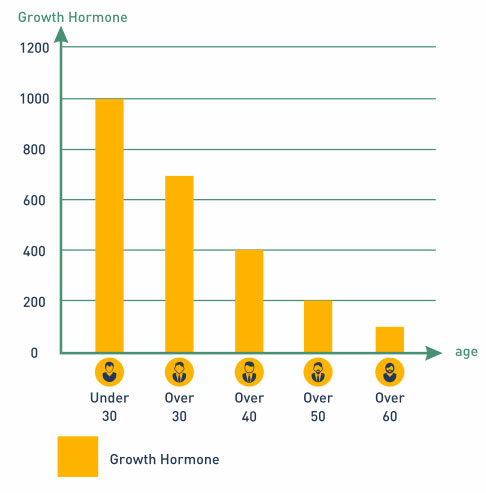HGH Levels in Men Over: 30, 40, 50, 60
The maintenance of proper HGH levels in men as they age is crucial for the body to be able to perform properly at work, at home, and at play. Many men with adult growth hormone deficiency discover that drive and motivation are waning to the point where job performance is at stake. Loss of interest in activities once enjoyed can take a toll on emotional well-being. Family life can be adversely affected. Human growth hormone can make that difference.
Age can take a toll on one’s body and life as a whole. It can rob energy, vitality, appearance, emotion, and stability from a person’s utmost existence. Adult-onset growth hormone deficiency can affect metabolism, immunity, libido, cellular reproduction, cognitive functions and more.
Treatment with HGH injection therapy is used when an adult’s production of GH decreases below what is needed by the body for proper functioning to occur. This report will examine optimum HGH levels in men, why they are decreasing, and what can be done to protect one’s well-being and health throughout life.
HGH Levels in Men by Age Chart
Before the age of thirty, normal growth hormone levels in the body can range from 500-1000 ng/ml. With each subsequent decade, this amount can decline anywhere from 10 to 15 percent, as illustrated in the chart below. What is listed here is the average range of GH in adult men by age.
Please note that these are averages, and can be subject to variations depending upon the amount of sleep a person gets each night, nutritional intake, the level of exercise, and the amount of stress in one’s life. Illness, injury, and other health concerns can also play a role in the amount of GH secreted by the pituitary gland.
The test used to measure growth hormone deficiency is the IGF-1 blood test, as demonstrated in the chart above. Normal IGF-1 blood levels for adults will typically be between 200 and 450 ng/ml. Since there is a 10 to 15 percent decrease each year after the age of thirty, the variation can be extreme.
Here is a breakdown of what to expect from HGH levels by age:
- HGH Levels in Men Over 30
There may be a slight energy decline as muscle growth requires increased exercise. A few extra pounds may appear under the belt, and gray hairs may be starting to arrive. Sexual frequency and duration may begin to wane, and crow’s feet may appear around the eyes.
- HGH Levels in Men Over 40
Energy and endurance will continue to decrease as the numbers on the scale go up. Muscle loss is starting to affect strength, and the hairline may be receding. More gray hairs are also growing in thinner. The skin is beginning to lose its elasticity. Reading glasses may be required. Sex is becoming infrequent due to low desire. Sleep issues may be present. Forgetfulness may occur at this time.
- HGH Levels in Men Over 50
Fatigue is becoming a constant companion as sleep is decreasing due to insomnia, stress, or other issues. Weight gain is frustrating, and excess fat is nearly impossible to lose. Thinning hair, sagging skin, and muscle loss is making a man appear older than his age. Eyesight is starting to wane, and frequent illnesses are interfering with productivity. Memory loss and cognitive impairment may be affecting daily life. Erectile dysfunction may be starting to interfere with intimacy. Mood changes are inexplicable.
- HGH Levels in Men Over 60
What has happened to my body and my life is a frequent lament of men in this age group who are suffering the effects of low growth hormone production. There is little energy, and all activities have been pretty much curtailed by this time. Workplace productivity is suffering due to poor focus, memory lapses, and low drive. Feelings of depression add to the social isolation that is present. Sex is virtually nonexistent. Life has lost most, if not all, of its enjoyment.
Why Levels Are Decreasing?
It is true for many individuals that growth hormone levels are decreasing with age. In fact, GH is not the only hormone that is subject to decline as a person gets older. Testosterone, estrogen, and progesterone also tend to drop in middle-age to later years of one’s life. Many people continue on with life at a general pace, but those who experience a significant reduction may start to notice adverse symptoms beginning to occur.
Age does bring about a steady decline, but lack of exercise, poor dietary choices, stress, and not enough sleep can make this happen even faster. In some cases, head trauma, brain tumors, or certain illnesses can affect the pituitary gland’s ability to secrete enough growth hormone for the body’s needs. When this occurs, treatment with HGH therapy can improve metabolic performance in crucial areas of physiological, physical, emotional, and mental functions.
Maintain Your Levels with HGH Replacement Therapy
At National HRT, our doctors are hormone replacement therapy specialists. They offer HGH injections to men, and women, who are found to be GH deficient following detailed blood analysis. This is especially beneficial for individuals who do not live in or near a city that has HRT specialists.
Blood testing can be provided at local labs, and all medications are delivered direct to the client. Treatment with HGH therapy can reverse the unpleasant changes shown in this report. Energy levels will be increased, mental functions will be improved, and the body will experience amazing rejuvenating effects.
To learn more about how a decrease in your growth hormone levels by age is affecting your life, and what you can do about it, contact our clinic for a free consultation with a medical advisor.




